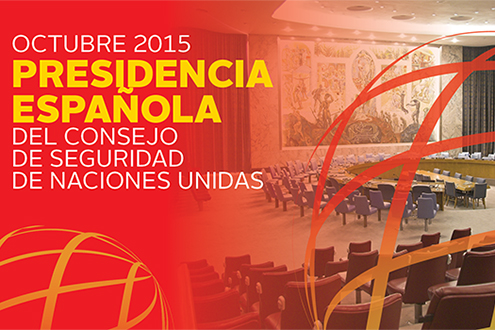The priority areas for action of the Security Council during the Spanish Presidency will include the Agenda for Women. Peace and Security, the response to humanitarian emergencies, in particular in Syria and Yemen, and the fight against terrorism, with particular attention to the perspective of victims. Aside from these priorities, we should highlight, as a commitment of our campaign to the Security Council, the transparency of the operation of the Security Council and its interaction with the other main bodies of the United Nations system, which will be materialised in an open debate on work methods on 20 October.
On 13 October, the President of the Government of Spain, Mariano Rajoy, will chair an Open Debate on Women, Peace and Security, at which the Secretary-General of the United Nations, Ban Ki-moon, the Executive Director of UN Women, Phumzile Mlambo Ngcuka, and representatives of civil society are due to take part, and which comes within the framework of the high-level review to assess the progress, renew the commitments and tackle the obstacles and limitations of the application of Resolution 1325 on this issue, adopted 15 years ago.
The response to the humanitarian crisis is another of Spain's priorities on the Security Council. During the course of this month, special attention will be paid to the crisis in Syria (in which our country performs the role of rapporteur on humanitarian issues) and in Yemen. The situation in Darfur will also be subject to analysis during the consultations on UNAMID, without forgetting the inclusion on the agenda of other humanitarian contexts according to how they unfold.
The fight against terrorism, identified as one of the greatest threats to peace and international security, will be subject to the attention of the Security Council from various perspectives. Spain will introduce a discussion on the role that victims of terrorism can play both in counteracting the discourse of violent extremism, and in strengthening the construction of resilient societies to the terrorist threat. On 21 October, an Informal Meeting of the Security Council will be held (under the Arria formula), jointly organised by Spain and the United States, which will be attended by victims from different countries, at which the Minister for Home Affairs will take part.
Furthermore, during the Spanish Presidency, on 22 October, an Open Debate on the Middle East will take place, chaired by the Minister for Foreign Affairs and Cooperation, José Manuel García-Margallo, at which the peace process and the issue of Palestine, the political aspect of the crisis in Syria and the situation in the region in general will be discussed, among other issues.
Other important events during this month will be the election of five new non-permanent members of the Security Council, on 15 October, the commemoration, through a public ceremony, of the entry into force of the Charter of San Francisco, on 23 October, (our country is pushing through the adoption of a political declaration at which the Preamble, the Purposes and Principles of the Charter will be reaffirmed), and the holding, on 29 October in Madrid, of the 60th anniversary of Spain's membership of the UN, at an event to which the Secretary-General of the United Nations, Ban Ki-moon, has been invited.





